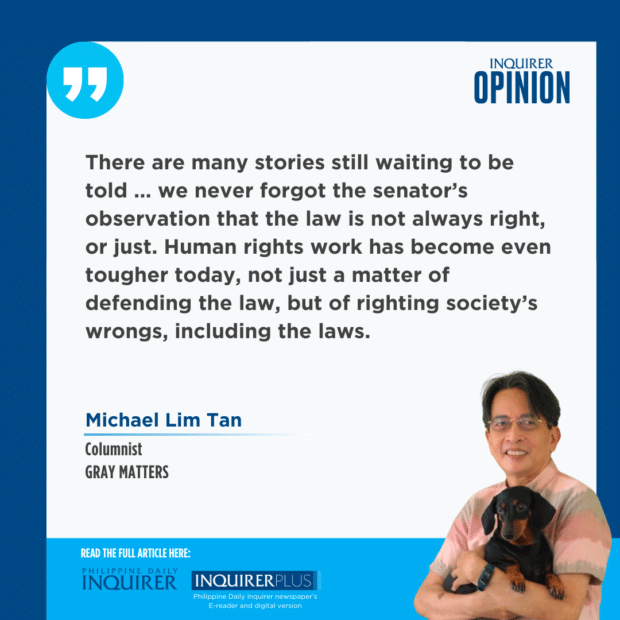
It was heartening to read that the Integrated Bar of the Philippines has inaugurated the IBP Human Rights Awards, the first recipients being three members of the National Union of People’s Lawyers (NUPL): Edre Olalia for Luzon, Kristian Jacob Lora for the Visayas, and Antonio Azarcon for Mindanao. The lawyers are noted for their handling of cases involving human rights violations, from landless farmers accused of subversion when they protest, to those arrested for protesting the Anti-Terrorism Act passed during the Duterte regime, to the ongoing repatriation of Filipino overseas worker Mary Jane Veloso, who was nearly executed by the Indonesian government.
The IBP, as its name implies, has as its members all those who hurdle the bar exams, an equivalent of the Philippine Medical Association for physicians. The two organizations are identified more as mainstream, reluctant to take sides in political controversies, so the new IBP award is a breakthrough, a recognition that human rights is identified as a vital part of the practice of law. At the same time, the IBP noted that its first three human rights awardees are members of an “endangered breed.”
I did check the figures and found out that 61 lawyers were killed during the Duterte presidency, more than the total murdered under the six presidents preceding Duterte. Three lawyers were killed during President Marcos‘ first year as president.
The news about the three IBP human rights awardees was heartening because they are relatively young, bringing us hope during this year’s commemoration of Human Rights Day (Dec. 10).
At the same time, I feel it’s important to remember the long history of lawyers involved in defending people’s rights even before the term human rights was institutionalized through the United Nations in 1948.
We go back to the Civil Liberties Union of the Philippines established in 1938, the name comes from the United States, where the CLU remains a formidable force especially when it comes to the rights of minorities.
The Philippine CLU (it was never known as CLUP) founders were Antonio Bautista, Jose B. L. Reyes, and Paulino Garcia. They took up many issues from the very beginning, including a case where its own founder, Bautista, was arrested for advocating a boycott of Japanese goods after its aggression in China. The CLU took up the case as an example of a violation of freedom of speech.
The CLU had colorful battles with President Manuel L. Quezon, opposing his attempt to impose a party-less system. Quezon eventually abandoned the idea of a party-less system but attacked the CLU in a speech at the University of the Philippines, threatening to hang every member from a lamppost.
During the Second World War, CLU members (which included non-lawyers) joined the resistance against Japan, four of them giving up their lives. After the war, the CLU took up other issues, including opposing the US Military Bases Agreement. In the years that followed, CLU pushed the government to address the economic and social reasons for the communist Huks movement, and the Red-tagging (the term wasn’t used then) by the Committee on Anti-Filipino Activities (Cafa) in Congress. This was when Claro M. Recto, Lorenzo Tañada Sr., Claudio Teehankee, and other civil libertarian lawyers rose to the challenges of the times by turning the tables around and calling for an investigation of Cafa.
Fast forward to the 1970s and martial law, which in its early days included the arrest of lawyers, notably Jose Diokno, who was imprisoned for two years. Shortly after his release, he formed, with Jose B. L. Reyes and Tañada Sr.—note how certain names are repeated across our history—the Free Legal Assistance Group (FLAG) in 1974, exactly 50 years ago.
FLAG worked closely with the Task Force Detainees of the Philippines, which was supported by the Roman Catholic Church. Tiny but feisty Sister Mariani Dimaranan and the task force functioned like emergency rescue teams running to the rescue, with FLAG’s lawyers and paralegals, whenever there were arrests, crackdowns on rallies, and outright massacres. But on a “routine” day, they were known for their visits to political detainees, helping them to establish livelihood projects from inside the jails, and arranging for relatives and friends to visit.
There are many stories still waiting to be told but I want to say, as one of the student volunteers with TFDP in its early days and the privileged occasions when we could meet with and listen to FLAG and Sen. Jose Diokno, we never forgot the senator’s observation that the law is not always right, or just. Human rights work has become even tougher today, not just a matter of defending the law, but of righting society’s wrongs, including the laws.
—————-
mtan@inquirer.com.ph